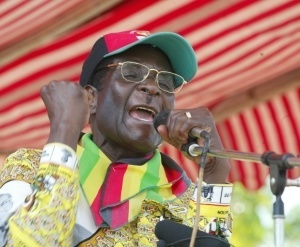
In response to my recent observations on President Robert Mugabe’s perceived culpability in some of the abuses committed against citizens by fellow Zimbabweans employed to protect him, Laiton Mkandawire raises interesting points expanding debate on an issue I feel is of crucial national importance. Report by Desmond Kumbuka
He also makes an astounding if somewhat gratuitous and exceedingly patronising generalisation that perfectly blameless African statesmen are routinely misrepresented by overzealous junior officers.
I also deduce from Mkanda-wire’s reaction the sense that he subscribes to the rather anachronistic African traditionalism which generally frowns on those who cast aspersions on leadership — there is an unwritten decree that says those in power can never go wrong. In this realm, those upon whom God has bestowed the mantle of leadership, become superhuman, infallible and totally above the foibles of ordinary mortals like the rest of us.
I guess the point Mkandawire tries to make is that President Mugabe should not be blamed for the indiscretions of his minions. He claims incidents such as the one of the soldier who abuses an elderly passerby and other similar incidents are never brought to his attention so that he could act on them, and that he only gets to read about them in the press. But the question that immediately comes to mind is —what does the President do after reading in the press about such disgraceful incidents at his doorstep? My guess, and I suspect most Zimbabweans would agree, is that he does absolutely nothing.
That is the crux of the matter. Mugabe’s public image, good or bad, is self-inflicted — because acts of violence committed ostensibly to protect him routinely go unpunished. I am prepared to bet my last dollar — If just one incident of a passerby along Chancellor Avenue was properly investigated through appropriate military or police channels, and those found guilty appropriately punished, such incidents would vanish overnight. A public statement by the President acknowledging these terrible events and assuring members of the public that he will not tolerate the harassment of innocent people would go a long way to curb the menace.
Take the example of Rwanda where just a few years after the horrific ethnic genocide in which an estimated 800 000 Tutsis and a fewer number of moderate Hutus were massacred, is today rated as one of Africa’s best emerging democracies. This is because under the leadership of Paul Kagame who, like President Mugabe, is often accused of authoritarian rule, acts of banditry, corruption and impunity have virtually disappeared. It takes a strong leader, and not one who only pontificates on discipline and ethical behaviour, to act decisively against those that transgress.
Zimbabwe is frequently mentioned among some of the most corrupt states of the world and this, whether we like it or not, is a reflection of leadership failure. President Mugabe is, we are reminded ad infinitum, the Head of State and Government and the Commander in Chief of the Zimbabwe Defence Forces — and he cannot be held responsible for the actions of those he heads and commands — give us a break.
- Chamisa under fire over US$120K donation
- Mavhunga puts DeMbare into Chibuku quarterfinals
- Pension funds bet on Cabora Bassa oilfields
- Councils defy govt fire tender directive
Keep Reading
Mkandawire wants Zimbabweans to believe President Mugabe is the epitome of exemplary leadership but that some of his youthful ministers, in their misguided zeal to be seen to be working, have taken government policies as if they are personal projects, as in the case of the empowerment and indigenisation policy. The basis upon which Mugabe should be blamed for such indiscretions, in my view, is that as the appointing authority and the ultimate supervisor of Cabinet ministers and their activities, he should be seen to act, and act decisively against those found wanting.
The mantle of leadership is not only about representing Zimbabwe at international fora like the UN, the AU or Sadc,— it is also about providing leadership at home so that institutions of state perform in accordance with their constitutional mandate to promote and safeguard the interests of all Zimbabweans.
Mkandawire then makes the rather trite proposal that in order to know Mugabe better in person, and not see him through biased western eyes, one has to get rid of the people that are barring our, as ordinary Zimbabweans, access to him. These are the enemies, Mkandawire writes, “the leeches feeding off our blood and making us suffer”. I could not agree more with this observation, but then who created these monsters and positioned them where they have the power to prevent us from meeting and knowing our President for all these years?
Lest I be misunderstood, I do not hate President Mugabe and remain one of the great admirers of his political astuteness. Although I have no interest in politics beyond being a responsible citizen concerned about inalienable rights of all Zimbabweans, I believe it is not about knowing what a good gentleman Mugabe is as an individual but that the leadership of his party and the government should guarantee my rights and freedoms.











